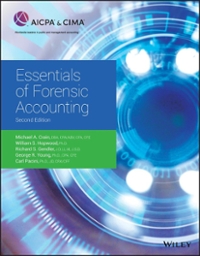Question
CASE EYE OF THE POTATO Small Fries, Inc. processes raw potatoes into various potato and derivative products and has two processing plants in the state
CASE
EYE OF THE POTATO
Small Fries, Inc. processes raw potatoes into various potato and derivative products and has two processing plants in the state of Idaho.IN February of 1996 Small fries' plant in Spud, Idaho, known as "Rundown," received a letter from the Occupational Safety and Health Administration (OSHA) notifying management that the plant had been selected for OSHA's "Top Fifty Pilot Targeting Program" (the Program).IN its correspondence, OSHA described the poor worker safety statistics for employers in the State of Idaho and offered Rundown two alternative actions under the Program.First, the plant could take no action, in which case the plant would be placed on the "primary inspection list," whereby the plant would receive an OSHA compliance inspection and would therefore be subject to the assessment of appropriate penalties for all violations noted.Second, as part of the Program, the plant could develop and implement a comprehensive action plan.The action plan would be evaluated using OSHA standards and required provision for corrective measures addressing the injuries and illnesses experienced by the employer.OSHA required the abatement period of the plan to be completed within one year.Employers submitting an acceptable action plan within 45 days would be placed on the "secondary inspection list."Employers on the secondary list would be subject to quarterly reporting and random inspection to verify implementation of the action pans.
Rundown responded to OSHA with an action plan shortly thereafter."Decrepit," another of Small Fries' facilities in Idaho, received a similar notice in December 1996 and responded with an action plan in January 1997.Based on current estimates, the aggregate cost to Small Fries for compliance with the action plans approximate $20 million, a material amount to the year-end financial statements.Both plants included this estimated aggregate amount in their 1997 operation budgets as "repair and maintenance" expenditures.The operating budgets were completed and approved in December 1996.No accrual or disclosure has been made in Small Fries' 1996 financial statements. Management's intent is to capitalize the costs as expenditures are made because most of the costs incurred will benefit future periods as worker injury is reduced and morale is improved.
Required:
Should the costs associated with OSHA compliance be capitalized as an asset or charged to expense?
Based on the approach you believe is most appropriate, when should Small Fries recognize the costs?Should they accrue now or expense as incurred?
Step by Step Solution
There are 3 Steps involved in it
Step: 1

Get Instant Access to Expert-Tailored Solutions
See step-by-step solutions with expert insights and AI powered tools for academic success
Step: 2

Step: 3

Ace Your Homework with AI
Get the answers you need in no time with our AI-driven, step-by-step assistance
Get Started


